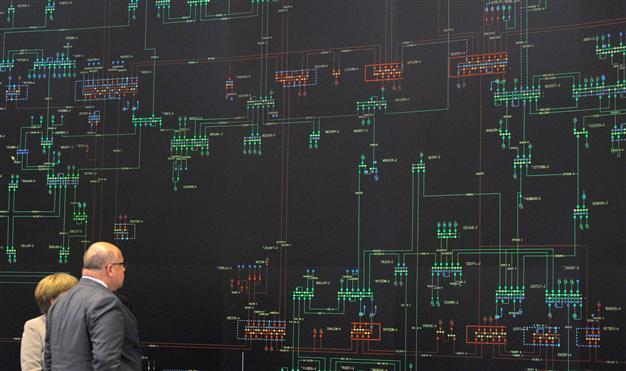Germany will coordinate with neighbours on nuclear exit
BERLIN - Agence France-Presse

German chancellor Angela Merkel (L) and Environment Minister Peter Altmaier (R) watch a board displaying the electrical network as they visit the German power supplier Amprion on May 29, 2012 in Pulheim, western Germany. AFP photo
German Economy Minister Philipp Roesler called Tuesday for close coordination with the country's neighbours on its nuclear energy exit over the next decade, including on expanding its electricity grid.
Germany's "energy transition", which is to see the country shutter its nuclear reactors by 2022 and ramp up the use of renewable power sources, "will not work without a European perspective," Roesler told a conference.
"Our neighbours, France, Poland, find it interesting what we are doing, to put it politely," he said, "but many of them are suffering the consequences without seeing the benefits.
"It makes sense to work together, for example on (electricity) grids," he added.
Germany decided one year ago in the wake of Japan's disaster at its Fukushima nuclear plant to speed up its withdrawal from nuclear power -- a decision that requires it to revamp its energy strategy.
In recent weeks, Chancellor Angela Merkel's government has come in for criticism for what industry officials say is a cripplingly slow approach to the transition, potentially threatening the energy supply in Europe's top economy.
Roesler, who is also vice chancellor, defended Berlin's efforts, noting that the "energy transition is a project of historic proportions".
"It should be clear to everyone that this will not happen in a year," he said, adding that "a lot has been decided in recent months".
Roesler, from the pro-business Free Democrats, said the state should not take the lead role in expanding infrastructure for the electricity grid.
"It is precisely because the task is so big that it can only be carried out in accordance with the principles of the market economy," he said.
Conservatives from Merkel's party have argued that the government would have to work along with key players in the sector to ensure the transition.
Expanding Germany's electricity grid to cope with the country's nuclear exit will cost about 20 billion euros ($25 billion) over the next decade, network operator Tennet warned last week.
Germany lacks in particular electrical cables running from the north to the south. While wind energy is essentially produced in the north, most of the demand comes from the more industrialised south and west.
